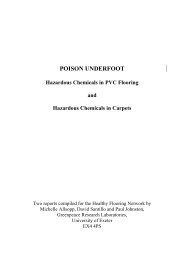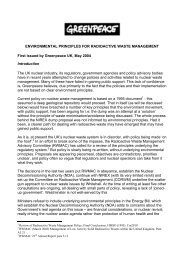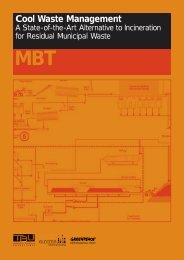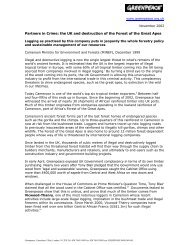The Real Green Revolution - Greenpeace UK
The Real Green Revolution - Greenpeace UK
The Real Green Revolution - Greenpeace UK
Create successful ePaper yourself
Turn your PDF publications into a flip-book with our unique Google optimized e-Paper software.
t e rracing has led to increases in the order of<br />
150% for a range of upland cro p s .<br />
<strong>The</strong> importance is not just that yields are<br />
i n c reased – important as that undoubtedly is –<br />
but that the increases are much more under the<br />
c o n t rol of the farmers and communities that<br />
p roduce them, in contrast to a high input<br />
agricultural model where the benefits go to the<br />
equipment and chemical manufacturers and<br />
seed merc h a n t s .<br />
Economic drivers<br />
A c ross the South, engagement with the<br />
lucrative and rapidly growing organic foods<br />
market in the industrialised world is still the<br />
main driving force behind the development of<br />
the certified organic sector. Organic cert i f i c a t i o n<br />
can generate big premia for primary pro d u c e r s ,<br />
especially from export markets. Although some<br />
g o v e rnments are now recognising the export<br />
potential of organic produce, its development<br />
so far has been driven almost exclusively by the<br />
NGO sector – often despite official hostility.<br />
Remaining challenges<br />
This re p o rt goes on to show that some key<br />
challenges remain, however. <strong>The</strong>se include the<br />
following issues:<br />
• Hostility from conventionally minded<br />
S o u t h e rn governments and established<br />
corporate and bureaucratic interests are still<br />
holding back the potential of organic and<br />
a g roecological agriculture .<br />
• Many Southern-based NGOs pro m o t i n g<br />
o rganic and agroecological approaches face<br />
crippling funding shortages, and are<br />
p revented from continuing their work often<br />
for want of very small amounts of money in<br />
comparison to that spent in the pro m o t i o n<br />
of conventional agriculture.<br />
• <strong>The</strong> overwhelming majority of Southern<br />
o rganic produce is still sold as unpro c e s s e d<br />
p r i m a ry commodities, leaving poore r<br />
f a rmers still exposed to the vagaries of<br />
world markets, and meaning that the<br />
benefits of processing and value-adding<br />
remain in the Nort h .<br />
• Much Southern-based organic production is<br />
for export to the industrialised world,<br />
raising the issues of ‘food miles’ and how<br />
best to protect local food security and selfreliance.<br />
However, local and national<br />
o rganic markets are developing in many<br />
p o o rer countries, notably Brazil, Egypt and<br />
A rg e n t i n a .<br />
• E x p e rtise in certification is still<br />
o v e rwhelmingly concentrated in the<br />
industrialised world, and achieving<br />
c e rtification is a major barrier to many<br />
f a rmers in poor countries who lack literacy<br />
and other skills and facilities necessary.<br />
What is needed<br />
This re p o rt makes some clear and practical<br />
recommendations for how organic and<br />
a g roecological agriculture should be support e d<br />
and promoted. Some of these are highlighted<br />
b e l o w.<br />
• G o v e rnments in the South should re t h i n k<br />
the promotion of artificial pesticides and<br />
f e rtilisers on poorer farmers thro u g h<br />
extension workers, subsidies and media<br />
campaigns, and at the very least re m o v e<br />
some of the barriers to NGO activity that<br />
c u rrently hinder the growth of the org a n i c s<br />
s e c t o r. At best, Southern governments should<br />
begin to re-orient their priorities –<br />
educational, institutional and legal –<br />
t o w a rds promoting ecological and<br />
sustainable agriculture.<br />
• Mechanisms for transferring indigenous<br />
knowledge from one locale to another need<br />
f u rther development and re s o u rcing.<br />
• W h e re de facto o rganic farming is practised,<br />
it is vital to help farmers develop selfconfidence<br />
in their traditional knowledge so<br />
that they do not immediately switch to<br />
chemicals once they can aff o rd them, as a<br />
6


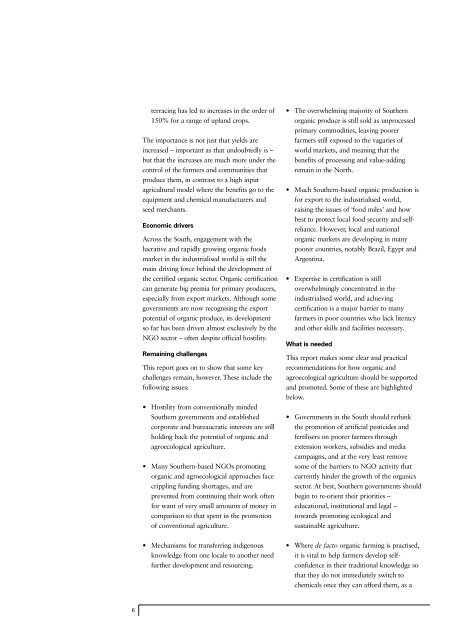

![[2007] EWHC 311 - Greenpeace UK](https://img.yumpu.com/22079793/1/184x260/2007-ewhc-311-greenpeace-uk.jpg?quality=85)
